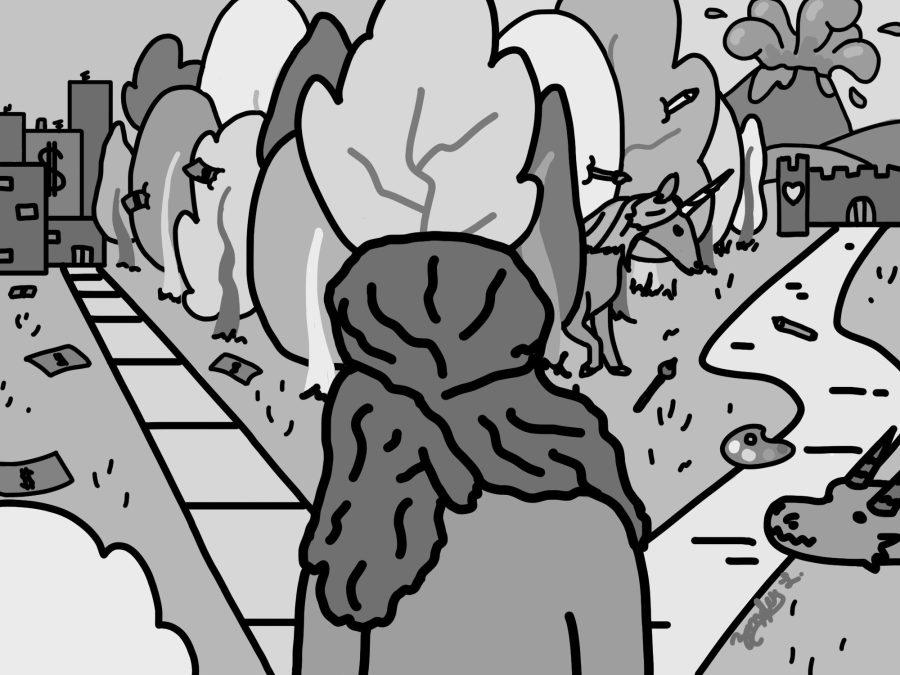Silicon Valley is the home to innovation, creative minds and academic excellence. However, the pressure put on high school students to pursue a career path not of their liking but rather one that is STEM-focused, is unparalleled. Because of our STEM-focused culture, many students feel the need to pursue majors and internship opportunities they don’t really care about. Then, when students arrive in college, they feel unreasonably confused and disinterested regarding their futures, unprepared for major-hopping or even dropping out of school, according to the Melinda & Bill Gates Foundation.
For many, the possibility of seeking an education or career in visual and performing arts can seem too risky; an uncertainty in job-settling and salary often casts doubt on the potential success one can obtain. Although it is true that only 10 percent of arts graduates are working artists, according to a study from Artists Report Back, more current artists do not have bachelor’s degrees, much less arts-related degrees — specifically about 40 percent do not have any degree. These artists are able to pursue their interests, usually without the overbearing loans that may come with attending art school.
Senior Rebecca Cheng will attend the Rhode Island School of Design next year and said art has always been part of her life. Although her parents suggested other pathways, she set her mind towards following her ambition. Cheng said people tend to look down on artists, assuming they are unable to handle rigorous and challenging fields like STEM.
Oftentimes, social pressure exists on students to give up their passions for a future that ensures a higher socioeconomic status. This is prevalent in competitive school environments; yet, as an artist, Cheng said she does not fear the stereotype known as the “starving artist” because she plans to actively seek out a variety of future opportunities.
Story continues below advertisement
As Cheng said, the pressure on students to prepare for money-making rather than developing a talent can easily affect future mental health and happiness.Although Paly does have excellent arts programs, a stronger focus is given to AP courses and required classes. The result is that all art classes are electives, and some are cancelled at the start of semesters due to low enrollment. Creative classes should be more heavily emphasized, whether this be through more credits or a change in the stigma regarding exploring unconventional education. Cheng said introducing more classes, especially in the visual arts, as well as upgrading current classes could give students a better opportunity to consider different options.
Photography teacher Margo Wixsom said she has expressed her disappointment in the school district’s intention to spend funds on computer education rather than arts, especially due to several electives programs being unaffordable. Parents’ and society’s pressures put upon students’ career decisions are very short-term. In fact, Wixsom, who cites her children’s experiences from college loans and inability to find jobs with sufficient wages, said that it is crucial for students to experiment with potential interests before coming to a decision in their careers. However, this cannot be done without erasing the paradigm of chasing money, for this easily leads students down a frustrating path with several expenses in the form of loans, to happiness.
Although students are told from a young age to “pursue their passion,” their interests can change as they research colleges and majors. Wellness Center Coordinator Elizabeth Spector and Outreach worker Angelina Michael said pressure that comes with having to shape a future in high school, along with pressure from parents, causes students to become lost in finding the right job to fit their desires.
According to Michael, intrinsic goals and aspirations often contrast with extrinsic motivators having to do with social expectations. Therefore, high schools should be better equipped to expose students to several different potential career paths that may be encompassed in a passion.
Spector said an example of this could be the art of singing. A student may think that the way to follow an interest in singing would be to take lessons and eventually get a degree in vocals, but they may not be aware of all the potential career paths in that field, from being a vocal agent to working in a studio.
Since colleges expect a certain direction from students, Paly should help students navigate other career options within pathways they may be interested in. Not only that, but the societal climate needs to grow towards setting a more realistic and high-achieving environments for students — especially through realizing the value that atypical careers bring to the world.
Michael points out that teachers in various districts statewide are on strike because of their financial situations, yet, here in the Silicon Valley, PAUSD teachers are looked upon as the most influential and beneficial resource to students. Particularly in this area, it is necessary to value other creative paths that will allow for further diversity in students’ future intents.
As for now, for those who continue to struggle to deal with the social, familial and personal pressures, there is a need for greater emphasis on the support that outside advisors can give students thinking about the future.
Wixsom and Michael both agree that rather than focusing on students’ completion of college requirements teacher advisors and counselors shoud focus on how to be successful in college. Parents are where the change can begin — they are the guiding forces in students’ lives, and especially in a setting such as Palo Alto, where several students are already financially supported, it makes sense to chase dreams rather than money.



